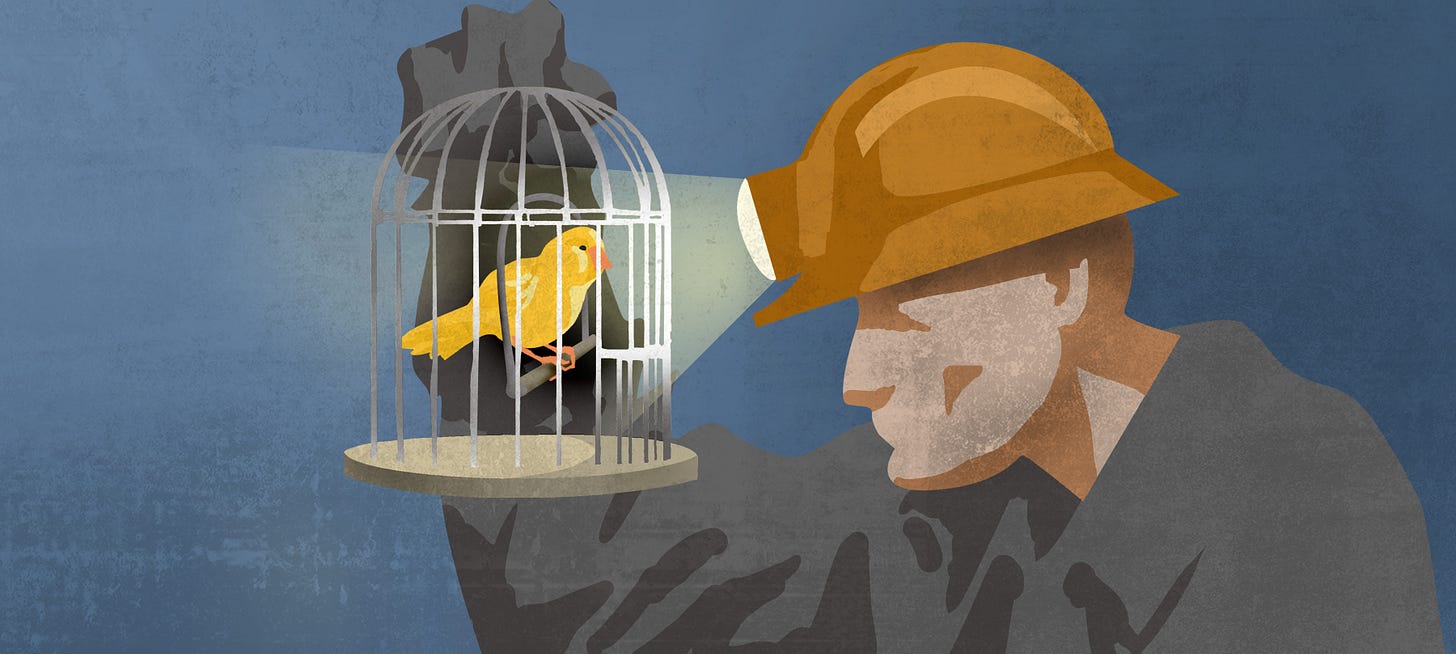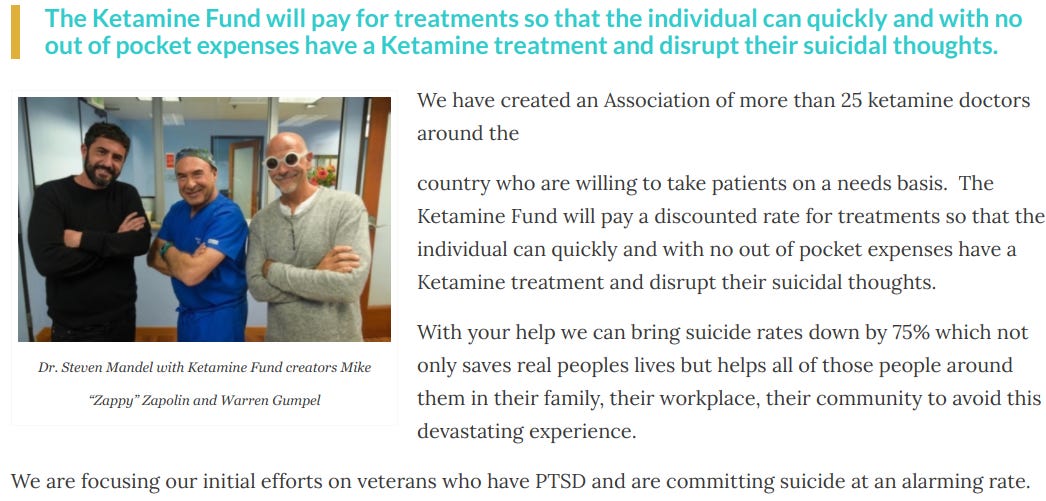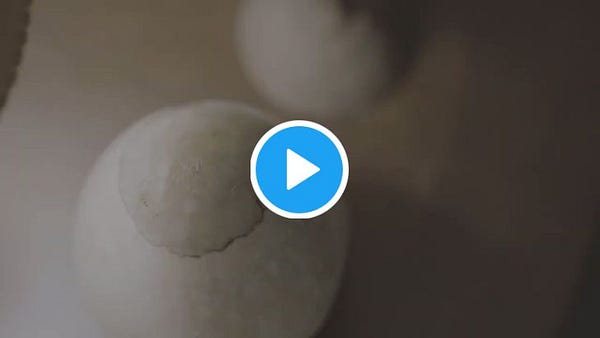Ketamine in the Coal Mine; Real-world psilocybin mushroom study launches; UK Rescheduling efforts Continue

The clinical use of ketamine for mental health conditions and the FDA approval of Spravato, the esketamine nasal spray, serves as the proverbial ‘canary in the coal mine’ for the upcoming challenges and opportunities facing psychedelic medicine.
Two ketamine stories surfaced this week:
The FDA approved Spravato for a second indication, Major Depressive Disorder with suicidal ideation
Acknowledgment from a Ketamine clinicians' professional organization that as the practice of subanesthetic ketamine grows, so do concerns about the experience and qualifications of those who administer it.
Ketamine has a long history of recreational use as well as medical use as an anesthetic.
Much research has been done to evaluate the anti-depressive qualities of subanesthetic ketamine, mostly via intravenous delivery of racemic ketamine, and results are promising.
Since ketamine is already used in medicine, physicians can prescribe it off-label. As a result, we are seeing the rapid growth of private ketamine clinics. These clinics are mostly cash practices since most off-label use is not covered by insurance, and the amount of preparation, integration, and support varies.
To be approved by the FDA for treating depression or other conditions, clinical trials on ketamine must be conducted. The challenge, however, is that the incentives for drug development do not make this a financially viable option for ketamine since the patent has expired.
In light of this, Janssen Pharmaceuticals, a Johnson & Johnson subsidiary, has developed Spravato, which is esketamine (the s-enantiomer), which was approved by the FDA for Treatment-Resistant Depression in 2019. FDA approval means that insurance should pay for it (in theory) and that doctors can more readily prescribe it.
However, I get the sense that providers and patients prefer off-patent intramuscular, sublingual, intravenous ketamine to the less effective, non-dissociative, but FDA approved and reimbursable yet wildly expensive Spravato.
Spravato approved for adults with major depressive disorder with suicidal ideation.
“Janssen’ Spravato (esketamine nasal spray) has received approval for use in combination with an oral antidepressant in treating depressive symptoms in adults with major depressive disorder (MDD) with acute suicidal ideation or behavior.
It is the first approved therapy shown to reduce depressive symptoms within 24 hours of administration. However, its effectiveness in preventing suicide or in reducing suicidal ideation or behavior has not been demonstrated.”
The Mighty published a thoughtful account of this issue, highlighting a few experts who weighed in.
Erick Turner, M.D., former reviewer of psych drugs for the FDA and associate professor at Oregon Health and Science University Department of Psychiatry was particularly harsh:
“There was no effect of ketamine compared to placebo. There was no advantage. But nevertheless, when you go telling people that the drug has been approved for major depression with suicidal patients, with suicidal thoughts and behavior, it misleads the listener into believing that this is going to help the suicidal thoughts and behavior. But again, there was no effect on that.”
On the other hand, Dr. Gerard Sanacora M.D., Ph.D. who is also a site Primary Investigator on this trial offered:
“it was very encouraging and satisfying to see the esketamine treatment add approximately an additional 12% on to these very favorable remission rates, and to show rapid improvement in mood symptoms beyond those of the high-level standard of care provided.
In sum, I believe these studies successfully show that the addition of esketamine to comprehensive clinical management plan for patients can produce both rapid and sustainable benefits to patients, with major depressive disorder experiencing acute suicidal ideation.”
This episode points to the challenges of conducting clinical science on conditions of the mind/consciousness and interpreting the results of these studies.
It highlights the challenges of nuanced and honest evaluation of this kind of research in the shadow of convoluted and misaligned incentive structures that permeate the modern healthcare system.
The challenge of developing ketamine, psilocybin or LSD, or any other off-patent product is that the path to approval is expensive and risky. Therefore the most common strategy has been to create something new that justifies patent protection so that when the work of clinical trials and approval is done, there is a window of market exclusivity, and investment can be recouped.
The problem, as evidenced by the Spravato story, is that the product that comes out the other end of the development pipeline could be inferior. Still, because it has the FDA stamp of approval, insurance will reimburse it (in theory). Because insurance will reimburse pharmaceutical companies can feel justified in charging what many believe is an unethical price.
No easy answers here.
Standards of Practice in the Therapeutic Use of Subanesthetic Ketamine
The other bit of Ketamine news comes from the American Society of Ketamine Physicians, Psychotherapists, and Practitioners, who note in a press release:
“As the excitement grows about the rapid and powerful effects that ketamine has against depression and suicidality, so does some concern about the number of clinics opening to treat it. More specifically, the qualifications and experience of the clinicians providing the care… There is a lot of variability between clinics administering ketamine and recommendations are essential to protect this valuable treatment. The number of clinics continues to expand rapidly and a clear standard is absolutely necessary.”
Adding to the complexity of the off label vs. Spravato issue is that of the growing trend of ketamine clinics and if and how standardization of training and administration should be implemented.
Again, noting the challenge of clinical science on conditions of the mind, there is a good argument that clinicians, with adequate training, could personalize ketamine treatments by exploring different dosages, routes of delivery, the time between sessions, etc.
Relatedly, once MDMA is approved, we'll be expecting some experimentation with the delivery model there as well, for example, group administration and other deviations from the current protocol will be an essential conversation amongst clinicians.
That conversation is happening now amongst ketamine providers, and groups like the Kriya Institute have been navigating these waters for years.
No easy answers here either.
Along these lines, I would like to plug The Ketamine Fund and ask that you consider a donation to this non-profit who is funding ketamine treatments for people who cannot afford it.

News and Headlines

Unlimited Sciences and Johns Hopkins launch a Real-world psilocybin mushroom study


On Your Next Psychedelic Journey, Let an App Be Your Guide
“In many ways, Field Trip is packaging and franchising a kind of “set and setting.” This version includes carefully designed protocols (a consultation plus six ketamine-infusion sessions, combined with nine therapy sessions, for $4,700), digital touch points (an online portal where patients can prepare for their trips and chart their progress afterward), and ambiance (mid-century modern furniture, jute rugs, many, many potted plants). Soon, a Field Trip session might be like a Sweetgreen salad or a Heyday facial—it doesn’t matter which location you go to, because you’ll find the same menu of services and the same airy, placid ambiance wherever you end up.”
Launch of the Sign, Send, Subscribe campaign to reschedule psilocybin for the U.K.'s mental health
“Those who wish to participate in the call for this simple but pivotal change can:
Sign the Gov.uk petition, “Reschedule psilocybin to reduce unnecessary barriers to mental health research.” (Currently awaiting publication. All participating organisations will share the link with their audiences when it is available.)
Send a letter to your MP, using the simple template letter provided to explain the issue.
Subscribe to the mailing lists of participating organisations for updates on the progress of the campaign and additional initiatives to get involved in.”
New Study Shows Ayahuasca's Benefits When Used in a Traditional Setting
“Until now, the majority of studies investigating ayahuasca’s effect on personality have taken place in clinical psychotherapeutic frameworks and church-based settings. However, this self-funded study is the first to examine the effects of ayahuasca on personality within Shipibo-style ceremonies that closely resemble the traditional use of the plants within the Peruvian Amazon.”
Thanks for reading, and see you next time!
Zach


